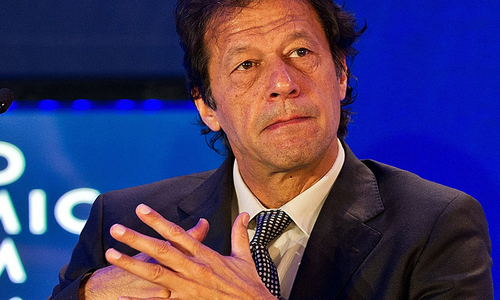ISLAMABAD: The Pakistan Tehreek-i-Insaf (PTI) has decided to press the government for improving the existing accountability laws, instead of bringing a new law altogether.
Background interviews with a number of PTI leaders showed that the party leadership had changed its previous stance of replacing the existing laws with a new legislation after start of the hearings of references against the Sharif family by the National Accountability Bureau (NAB) in the light of the July 28 verdict of the Supreme Court in the Panama Papers case.
Sources in the PTI told Dawn that it was because of the leadership’s decision to change its stance that the party had changed its representative Shah Mehmood Qureshi and now MNA Dr Shireen Mazari had been entrusted with the task of representing the party in the parliamentary committee headed by Law Minister Zahid Hamid.
Imran wants mechanism for ‘across-the-board’ accountability
In her first appearance before the committee on Oct 11, Dr Mazari rejected outright the government-proposed draft of the bill and announced that her party would bring its own draft.
In another major shift in the party position, sources told Dawn that PTI chairman Imran Khan had directed the party’s internal committee on NAB laws to discuss a “mechanism” for the across-the-board accountability as there should be no concept of “sacred cows”. The committee, the sources said, was expected to meet on Monday (tomorrow).
Earlier, the party had taken the position that the judiciary and the military should not be brought under the ambit of the accountability laws under the civilian set-up since the two institutions had their own inbuilt systems for it.
A key party office-bearer, on condition of anonymity, confirmed that Mr Khan had taken notice of the criticism in a section of the media over the party’s stance over the issue.
He also confirmed that the decision to replace Mr Qureshi with Dr Mazari had been taken because of the changed strategy by the party. He said they decided to nominate Dr Mazari because it would have been difficult and awkward for Mr Qureshi to suddenly reject the draft, as earlier the party had been actively participating in the meetings of the parliamentary committee.
The party is also opposed to the concept of “across-the-board accountability” and wants that the judiciary and the army should not be brought under the system being headed by civilians.
After getting the new responsibility by the party leadership, Dr Mazari has now started consultations within the party on the issue and met legal wizard Babar Awan on Saturday.
According to an official handout, the two PTI leaders reviewed in detail the draft of the government-proposed bill and decided that the party would give its proposals in writing to the committee during its next meeting scheduled to be held on Tuesday.
After attending the committee’s meeting, Dr Mazari had stated that her party had some six to seven major objections to the draft which was being discussed at the committee level to replace NAB with a new and powerful accountability commission.
Dr Mazari said the PTI would not accept the existing draft which, according to her, had been prepared to “cover up” corruption. She regretted that in the existing draft, the burden of proof had been put on the prosecution, instead of the accused person, and that her party would never accept it.
Similarly, she alleged that in the government-proposed draft the special powers of the NAB courts had been curtailed.
PTI vice-chairman Shah Mehmood Qureshi, who had represented the party in the previous about a dozen meetings of the parliamentary committee, said the party believed that instead of bringing a new law, the existing National Accountability Ordinance, 1999, should be improved by removing the “weaknesses” in it.
Talking to Dawn, Mr Qureshi claimed that there was complete consensus in the party that there was no need to bring the judiciary and military under the ambit of the NAB laws since the two institutions had their own inbuilt system of accountability.
Responding to a question, Mr Qureshi denied the reports that he had been removed from the parliamentary committee because of difference of opinion with the leadership on some clauses of the proposed National Accountability Commis-sion bill. Instead, he said, he had himself nominated Dr Mazari in the parliamentary committee because of his pressing engagements which also involved extensive travel.
Mr Qureshi said that since Dr Mazari was based in Islamabad, she would be available for the committee’s meetings, which was expected to be held on a daily basis.
Meanwhile, PTI’s newly-appointed acting information secretary Fawad Chaudhry said the party was opposed to the government’s proposal that NAB should be headed only by the serving or retired judges. Similarly, he said, the party wanted that the NAB chief should be nominated by a parliamentary committee, but the name should be finalised by the Supreme Judicial Council.
Published in Dawn, October 15th, 2017















































